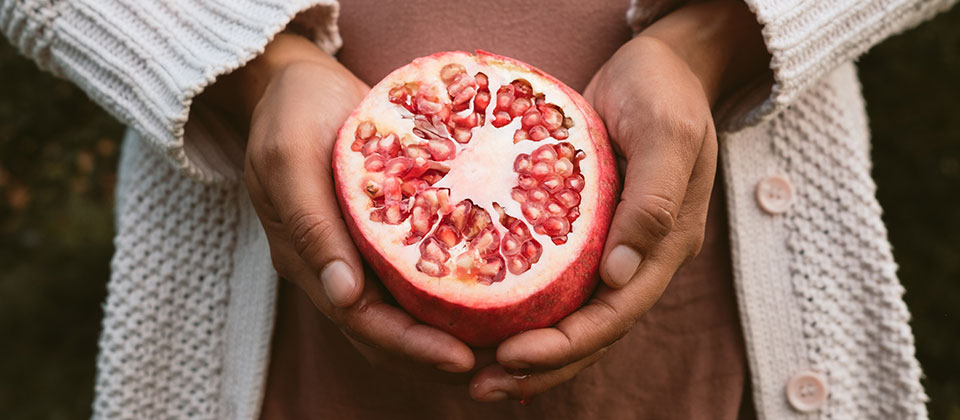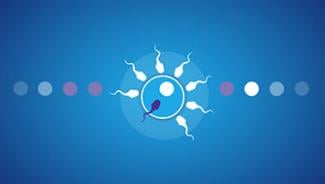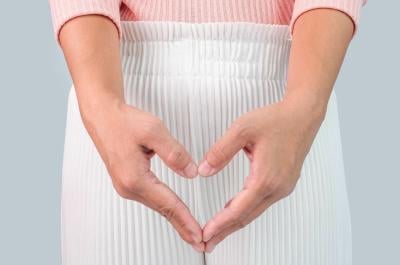Myths and facts about fertility nutrition

Myths and misinformation surrounding fertility and nutrition abound. While advice from your partner, friend or family member is often well-meaning, it’s not always accurate. But who has time to dig up scientific studies to separate fact from fiction?
You just want to have a baby.
The good news? Figuring out the foods that are thought to increase fertility in women is actually quite simple. A 2018 study looked at the growing evidence of the effects diet has on fertility and concluded that “diets high in unsaturated fats, whole grains, vegetables and fish have been associated with improved fertility in both women and men.” The study went on to say that “saturated fats and sugar have been associated with poorer fertility outcomes in women and men.”1
So, is the secret to boosting your fertility simply a healthy, well-balanced diet? What about those pineapple cores you keep hearing about it? And can eating yams really lead to twins? Let’s find out.
Pineapple and pregnancy
Rumor: Eating pineapple core will help with implantation
Reality: You might have heard that eating the core of a pineapple immediately after ovulation can help with implantation. Pineapple cores contain bromelain, a group of enzymes that acts as a blood thinner and has been shown to have anti-inflammatory properties.2 However, no studies have definitively shown that the bromelain found in pineapple core aids in implantation. That said, eating fresh pineapple rich in Vitamin C and B6 (while steering clear of the gritty core) can be a good way to add a healthy fruit to your diet.
Yams and fertility
Rumor: If you want twins, eat yams.
Reality: Every year Igbo-Ora, a city located in southwestern Nigeria, celebrates World Twins Festival — with good reason. For years researchers have been studying the rate of twin births in this area of the world; recent research suggests that 40.2 deliveries out of 1,000 result in twin births, ranking this region one of the highest for recorded twin births in the world.3 This study goes on to say that the “high twinning rate is due to consumption of yam (Discorea sp.), which is believed to contain a natural hormone phytoestrogen, which may stimulate multiple ovulation.”
However, a 2020 study showed that high rates of twinning in Igbo-Ora are likely the result of multiple factors — not just yams. Instead, researchers point to a soup made with ilasa (okra leaves), which is eaten with amala (yams or cassava flour) as a likely contributor. Keep in mind, too, that yams make up a large part of a woman’s diet in Igbo-Ora. Unless your diet has been similar your whole life, introducing more yams into your diet now may not provide a fertility boost.
So, is there a connection between yams and fertility? While there is no harm in eating yams, which are rich in fiber, vitamins and minerals, there is little evidence that doing so will have a direct correlation with conceiving twins.
Pomegranates and fertility
Rumor: Pomegranates support fertility health
Reality: Pomegranates reportedly benefit both male and female fertility. Rich in antioxidants, some say eating pomegranates – long a symbol of fertility – can increase blood flow to the uterus and thicken the uterine lining. However, studies show that more evidence is needed to better understand how antioxidants impact fertility.5 There have been some promising studies on the effects of pomegranate juice and seed oil on sperm quality – but only in rats.6, 7
Cinnamon and fertility
Rumor: Cinnamon can combat PCOS.
Reality: This spice can reportedly control your blood sugar levels, increase sperm production and quality in men, and may help with blood flow to organs (especially if mixed with honey!). Preliminary data suggests cinnamon may help women with PCOS,8 a common cause of infertility. According to a study in Reproductive Biology and Endocrinology, supplementing cinnamon has shown to improve insulin resistance and therefore may be a possible therapeutic agent for treating PCOS — but only in mice.9
Multivitamins and fertility
Rumor: Multivitamins aren’t just for pregnancy — they can also help you conceive.
Reality: Studies show prenatal vitamins, particularly folic acid, help prevent neural tube defects.10 But more recent studies have shown that “micronutrients have essential roles in fertility, and inadequate levels can have an adverse impact on the ability to conceive.” While more research is needed, these studies suggest that women who supplement their diet with vitamins and minerals while trying to conceive may have better outcomes.11
The bottom line: Talk with your healthcare provider
Your healthcare provider is your best resource for nutritional advice when trying to conceive. They will have the most up-to-date information from the latest studies, giving you more time to focus on what’s most important – getting pregnant. To learn what other factors could affect your fertility and ovulation, check out our detailed overview of common fertility problems. And discover more ways to boost your fertility health. (We promise none of them involve pineapple cores.)
Sources:
- Panth, N., Gavarkovs, A., Tamez, M., & Mattei, J, (2018), “The Influence of Diet on Fertility and the Implications for Public Health Nutrition in the United States,” Frontiers in public health, (6,211), https://doi.org/10.3389/fpubh.2018.00211.
- Pavan, R., Jain, S., Shraddha, & Kumar, A., (2012), “Properties and therapeutic application of bromelain: a review,” Biotechnology research international, (2012), 976203, https://doi.org/10.1155/2012/976203.
- Akinboro, A., Azeez, M. A., & Bakare, A.A., (2008), “Frequency of twinning in southwest Nigeria,” Indian journal of human genetics, 14(2), 41–47, https://doi.org/10.4103/0971-6866.44104.
- Omonkhua, A.A., Okonofua, F.E., Ntoimo, L., Aruomaren, A.I., Adebayo, A.M., & Nwuba, R., (2020), “Community perceptions on causes of high dizygotic twinning rate in Igbo-Ora, South-west Nigeria: A qualitative study,” PloS one, 15(12), e0243169, https://doi.org/10.1371/journal.pone.0243169.
- Smits, R.M., Mackenzie-Proctor, R., Fleischer, K., & Showell, M.G, (2018), “Antioxidants in fertility: impact on male and female reproductive outcomes,” Fertility and sterility, 110(4), 578–580, https://doi.org/10.1016/j.fertnstert.2018.05.028.
- Nikseresht, M., Fallahzadeh, A.R., Toori, M.A., & Mahmoudi, R., (2015), “Effects of Pomegranate Seed Oil on the Fertilization Potency of Rat's Sperm,” Journal of clinical and diagnostic research: JCDR, 9(12), FF01–FF4, https://doi.org/10.7860/JCDR/2015/12576.6853.
- Türk, G., Sönmez, M., Aydin, M., Yüce, A., Gür, S., Yüksel, M., Aksu, E.H., & Aksoy, H., (2008), “Effects of pomegranate juice consumption on sperm quality, spermatogenic cell density, antioxidant activity and testosterone level in male rats,” Clinical nutrition (Edinburgh, Scotland), 27(2), 289–296, https://doi.org/10.1016/j.clnu.2007.12.006.
- Kort, D.H., & Lobo, R.A., (2014), “Preliminary evidence that cinnamon improves menstrual cyclicity in women with polycystic ovary syndrome: a randomized controlled trial,” American journal of obstetrics and gynecology, 211(5), 487.e1–487.e4876, https://doi.org/10.1016/j.ajog.2014.05.009.
- Dou, L., Zheng, Y., Li, L., Gui, X., Chen, Y., Yu, M., & Guo, Y, (2018), “The effect of cinnamon on polycystic ovary syndrome in a mouse model,” Reproductive biology and endocrinology: RB&E, 16(1), 99, https://doi.org/10.1186/s12958-018-0418-y.
- “Neural Tube Defects,” (2017, December), Practice Bulletin No. 187, The American College of Obstetricians and Gynecologists, https://www.acog.org/clinical/clinical-guidance/practice-bulletin/articles/2017/12/neural-tube-defects.
- Schaefer, E., & Nock, D, (2019), “The Impact of Preconceptional Multiple-Micronutrient Supplementation on Female Fertility,” Clinical medicine insights. Women's health, 12, 1179562X19843868, https://doi.org/10.1177/1179562X19843868.

Get pregnant naturally
Ovulation tests are accurate and simple to use.




